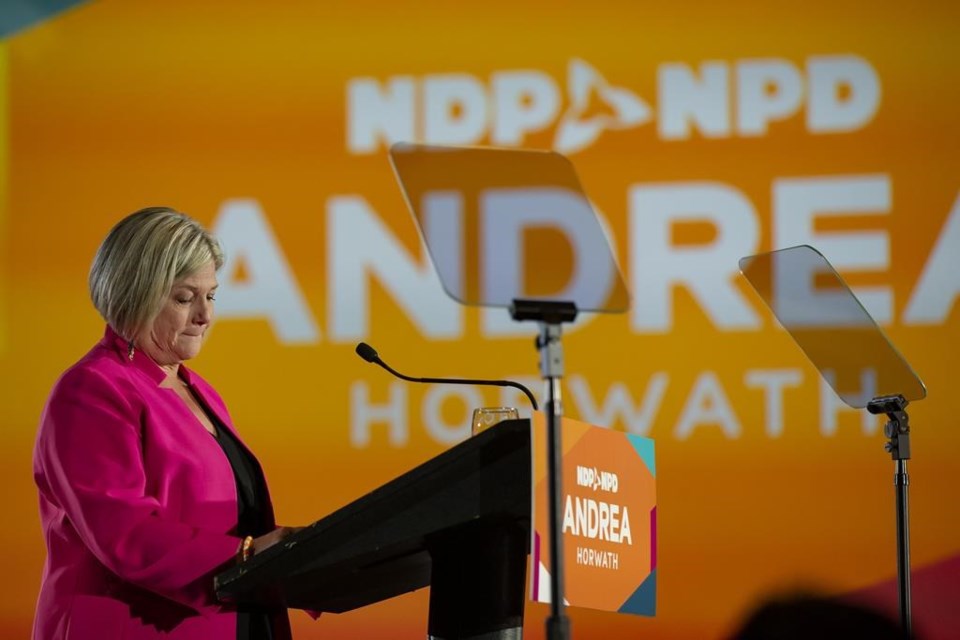HAMILTON — Ontario's New Democrats held on to official Opposition status Thursday but lost their longtime leader after their efforts to unseat the Tories came up short.
Andrea Horwath, who led the party through four provincial elections, declared an end to her term in an emotional speech in which she thanked everyone who had supported the NDP.
"My commitment to you is never going to waver and I'm going to keep working to earn your confidence each and every day," she told a crowd of supporters in Hamilton Centre, where she won her seat.
"But tonight, it's time for me to pass the torch, to pass the baton, to hand off the leadership of the NDP. It makes me sad, but it makes me happy because our team is so strong."
Horwath took the party to official Opposition status in 2018 and saw the NDP secure that position again on Thursday, with the party leading or elected in 31 seats.
Some key losses for the NDP to the Tories – who won a larger second majority – included Timmins, a region Gilles Bisson had represented since 1990, the southern ridings of Essex and Windsor-Tecumseh and all three Brampton ridings the New Democrats won last time, despite the party spending several days campaigning in Brampton to secure its voter base there.
In her fourth crack at becoming premier, Horwath had pitched the NDP as the only alternative to Doug Ford's Tories, saying the party could "fix" what she called "broken" in the province, such as the health-care system that saw longstanding challenges like staff shortages and a surgical backlog exacerbated during the COVID-19 pandemic.
She pledged to stop the privatization of care, hire more nurses and make life more affordable for Ontarians by increasing the province's minimum wage to $20 per hour, working with the federal government to deliver $10 a day child-care and taking steps to address the housing crisis.
Horwath's campaign was briefly sidelined with a COVID-19 diagnosis, which put a damper on her plans to visit several cities in northern Ontario. She called that her "only regret" on the campaign trail.
The NDP would continue standing up for "everyday working families" as the official Opposition, Horwath said.
"I can guarantee you, Ontarians, that as your official Opposition, we will work hard every single day to fix what matters most to the people of our province of Ontario," she said.
The daughter of an autoworker, an avid baker, and first woman to lead the Ontario NDP, Horwath was at the helm of the party since 2009. Prior to that, she served on Hamilton city council for three terms before being elected to the Ontario legislature in a byelection in 2004.
Peter Graefe, an associate political science profesor at McMaster University, said Horwath's ability to take the NDP to official Opposition status twice likely makes her the second most successful leader of the party after Bob Rae, who served as premier from 1990 to 1995.
However, Graefe said Horwath did not manage to sustain her popularity over the course of her leadership, he said.
"In the past, she had been the most popular party leader and people liked her, but coming into this campaign, the polling showed her less popular. People began to think of her as too negative," he said.
"And I suspect there's also a certain gendered aspect to that, of women who criticize men in power, probably pay a bigger price in terms of their impression, whereas for men, sometimes that actually strengthens them."
Graefe said another challenge Horwath faced was that she could not "shake the idea" that she had not succeeded in the last three elections.
Whoever takes the helm of the Ontario NDP next will have to find a way to better appeal to Ontarians, Graefe said, but first they must gain recognition.
"You have to first get Ontarians to know you," he said. "And that's going to take some time, I think."
This report by The Canadian Press was first published June 2, 2022.
———
This story was produced with the financial assistance of the Meta and Canadian Press News Fellowship.
Noushin Ziafati, The Canadian Press

